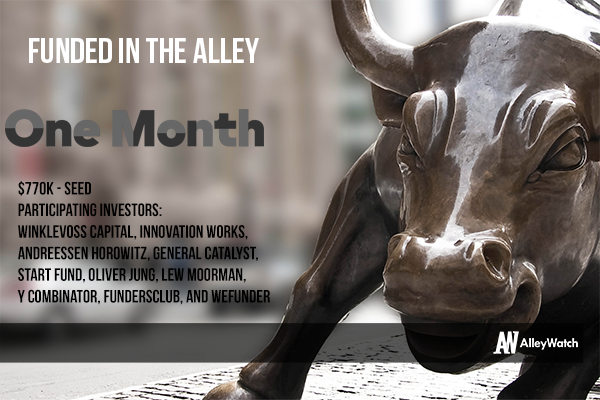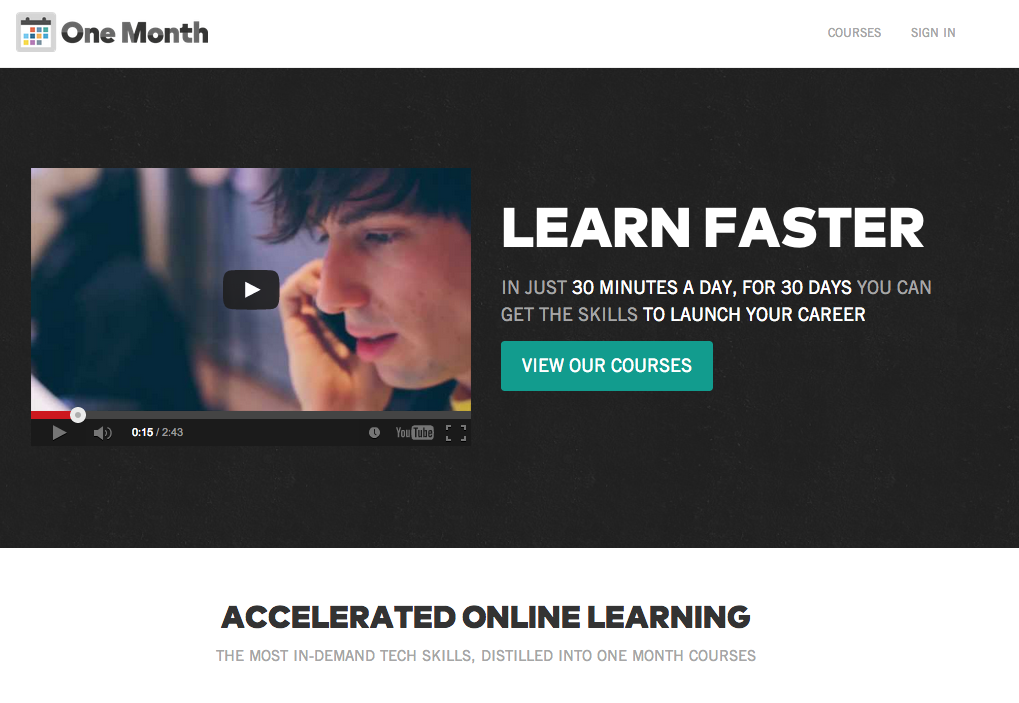The company is called One Month, investors include Winklevoss Capital, Innovation Works, Andreessen Horowitz, General Catalyst, Start Fund, Oliver Jung, Lew Moorman, Y Combinator, FundersClub, and the crowdfunding platform WeFunder, and here’s the story:
They came out of YCombinator just last year (as One Month Rails), broke sales records on Skillshare (it’s still that platform’s top selling programming courses), relaunched as One Month, expanded their offering to include HTML/CSS and Growth Hacking. Now, co-founders Mattan Griffel and Chris Castiglione just closed a $770k seed round to help build out their accelerated learning platform out even further.
The idea is that you spend 30 minutes a day, get one month worth of tutorials (and help, when you need it) and you’re good to go. Griffel is here to fill us in on how they accomplished so much so quicly. Listen and learn.
What was the funding process like?
We benefited a lot from Y Combinator and what that comes with – being pre-vetted, using standardized notes and terms, and leveraging their existing investor connections. Coming out of demo day last year, we had a list of about 20 investors who wanted to talk with us and it was mostly a matter of following up with those investors, as well as reaching out to a few others on our own.
That being said, it still took several months to finalize all the investments. We ended up also doing a crowdfunding campaign through our fellow Y Combinator alumni, WeFunder, which was the last money that we closed.
The process was stressful – but addictive in a way. We knew we wanted to close the money quickly so that we could go back to building the product – because fundraising really does become a full-time job. But fundraising can become a lot of fun, so it’s a little hard to transition back into product-building.

What are the biggest challenges that you faced while raising capital?
The biggest challenge was defending the viability of a model that a lot of investors considered a content-play. It’s hard to scale high-quality content – much harder than it is to scale a technology – so we not only had to prove that we could do it as a team, but we also had to prove that the potential opportunity was big enough for most investors to care.
There isn’t too much precedent for $1B companies in the education space, so that makes most investors more skeptical about the potential success of an education company.
But this is true for every startup – there are always reasons for investors to be skeptical – so the real challenge is finding and connecting with the investors who believe in the vision and have a strong emotional connection to the idea.
What factors about your business led your investors to write the check?
The biggest factors were previous success, being a Y Combinator startup, and the experience of the founding team in the education space.
Most of the people who ended up investing had some experience with online education – usually trying to learn something online – and realized that the current model was broken. One had taken a photography class and ended up really frustrated, until he found one that followed our project-based learning model, which was a breakthrough for him. So when he heard our story and vision he was already sold.
What advice can you offer companies in New York that do not have a fresh injection of capital in the bank?
Plan in advance. Raising money is not just a matter of starting to knock on investors’ doors. You need to get your business in the right place in terms of numbers and growth – ideally you have an exponential looking growth curve that puts you right at the point of breakout success as you start pitching investors.
You want to start building relationships with investors early – long before you actually start fundraising. That way, you’re not reaching out cold and trying to build out an entire story in a short amount of time. That’s a very hard thing to do.
Where do you see the company going now over the near term?
Our big challenge is building out an incredibly strong curriculum of one-month courses that students want to take. If we can do that, then we’ll grow – no question. That’s a good and a bad thing. It’s tough, for sure, but it’s also totally within our control. It means hard work and long hours.
We’ve also grown the team to 5 full-time people, and still plan on expanding further.
What’s your favorite 30-minute leisure time activity (that’s printable)
Ha! What a question.
My favorite thing to do these days is watch improv comedy shows at the UCB in Chelsea. When the lights go off and there’s a group of people in front of you creating some amazing scene in front of you on the fly, it’s easy to forget everything else. It’s just the right amount of escapism that lets my brain relax, get creative, and then come back afterwards feeling invigorated and ready to go.





